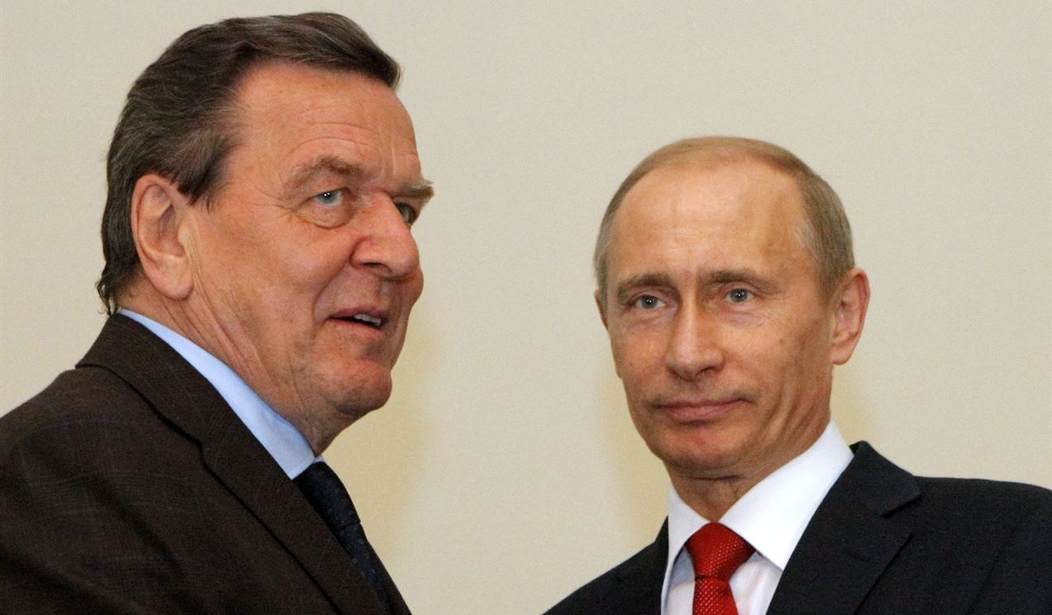It’s not as though Germany didn’t get warned about their reliance on cheap Russian energy. The US went so far as to sanction the Nordstream 2 project in order to disincentivize Germany from expanding their addiction to Vladimir Putin’s natural gas, but Gerhard Schroeder and Angela Merkel proceeded to shut down coal generation and nuclear plants to gain points with the Greens. (Not to mention Schroeder’s point-scoring with Putin, who repaid him literally with a high-salary position at Gazprom.)
Now that Putin’s imperialism has come to its full fruition, Germany can no longer afford to pander to the environmentalists. Today, the New York Times reports that Berlin will order the restart of its coal-fueled electrical generation plants as natural gas reserves run low:
Germany will restart coal-fired power plants in order to conserve natural gas, the country’s economy minister announced on Sunday, amid concerns about a looming supply shortage after Russia cut gas deliveries to Europe this week.
The move was part of a series of measures, including new incentives for companies to burn less natural gas, announced by Germany as Europe takes steps to deal with reduced energy supplies from Russia. …
Germany has relied heavily on energy imports from Russia for decades. Last year, Russian imports accounted for 55 percent of the country’s natural gas supply. But after Moscow’s Feb. 24 invasion of Ukraine, Berlin began purchasing gas from Norway, the United States and the United Arab Emirates, reducing its purchases from Russia by about 20 percent.
There’s nothing funny about the hole Germany has dug for itself, economically and strategically. Germany has largely funded Russian imperialism under Vladimir Putin by relying on Russia’s cheap energy exports. That situation should have changed in 2014, when Putin first invaded and seized Crimea and his proxies grabbed large portions of the Donbas. One could have excused Merkel and Germany for blithely missing the signals sent by Putin’s 2008 invasion of Georgia, but by 2014 Putin’s naked imperialism was clear for all to see.
Instead, Germany proposed to partner on Nordstream 2 for even more reliance on Russia while simultaneously taking their coal and nuclear power facilities offline. The remaining three nuclear facilities are due to be decommissioned this year, although apparently Berlin may be thinking twice about that now, too. Foreign Policy reports today that voices are finally pushing back against the Greens that have long dominated energy policy in Germany to question the wisdom of the nuclear disconnect:
Though the proposal may seem obvious—the power plants are quite literally in plain sight—Germany’s deep-rooted anti-nuclear orthodoxy has rendered such suggestions political heresy. This is why it was so revealing to hear the country’s most prestigious economic body—whose economists are sometimes referred to as the “Five Sages”—resort to such a refrain. It was a rare show of helplessness on the part of the German intelligentsia. Fear of a nuclear meltdown runs high in Germany, and the specter of such a disaster is often enough to discredit good-faith arguments in favor of nuclear power. …
Popular opposition to all things nuclear in many ways forms the bedrock of the modern German political psyche, providing principled guardrails to a people who are rightfully risk averse, and Berlin has in recent years moved closer to the publicly demanded imperative of eradicating nuclear power and working toward the disarmament—and ultimate abolition—of nuclear weaponry.
But Russia’s war in Ukraine has cast an uncomfortable realist shadow over these campaigns, which were allowed to flourish largely unchallenged for decades by the dual comforts of U.S. security guarantees and Russian pipelines. Now, the anti-nuclear movement is facing an existential moment. German politicians and civil society must decide whether to continue down the anti-nuclear path or reluctantly acknowledge that nuclear technology will be part of Germany’s future. Either path will be risky and will have the potential to change the balance of power in both Europe and the world at large.
Now the geopolitical risks of outsourcing energy have become apparent even to the Greens. FP notes that a recent poll shows a marked shift away from the anti-nuclear position, even though a majority are still reluctant:
But for Klute, the biggest story is not the about-face among the SPD or CDU electorate but how precipitously Green resistance to nuclear energy has fallen since Russia’s invasion of Ukraine. “In no other party is the uncertainty—am I for nuclear energy or am I against it?—as big as in the Greens,” he said.
In survey data from May and June 2021, about 70 percent of Green voters opposed nuclear power, with 22 percent in favor and 8 percent uncertain. By spring of this year, opposition had dwindled to just 56 percent, with 32 percent in favor and 12 percent uncertain.
Germany faces a stark choice. They can either become a vassal of Putin by remaining addicted to his energy exports or they can start becoming self-reliant on energy production. That leaves them with a clear choice between nuclear and coal, because in no scenario will Germany be able to install enough wind and solar facilities to meet the demands of a modern economy. As wind becomes a larger part of their electricity profile, so too do variations on their output, some of which has caused significant damage to end users. (Voltage regulators have become very popular as a result in Germany, FP notes.)
That leaves clean nuclear or coal as Germany’s two realistic options. Germany has the sixth-largest reserves of coal in the world, but only ranks 59th on proven natural-gas reserves. It’s either coal or nuclear, or more rationally a combination of both, that will allow Germany to responsibly produce the energy it needs to maintain its economy and standard of living without knuckling under to Moscow. The Greens either need to grow up and grasp this, or find themselves on the outside looking in on the post-Ukraine political reality.








Join the conversation as a VIP Member